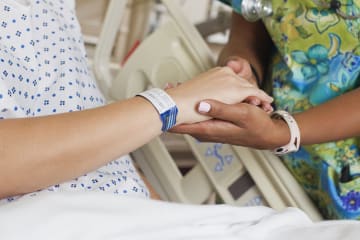
What is pain in the hospital like?
You may feel some pain during your stay in the hospital. A certain amount of pain from an injury or surgery is common and normal.
Pain is your body's way of letting you know that something is wrong. Your body's nerve endings send pain signals to your brain. Everyone feels pain differently. It can be dull or sharp. It can throb or burn. It can move from one part of your body to another.
No matter how much or why or for how long it hurts, pain can make it hard to move, sleep, and recover. Your care team will work with you to help manage your pain.
How will it be managed?
Your doctor will explain how much pain you should expect and how long it may last. This will depend on what is causing your pain.
Controlling pain doesn't always mean that you will feel no pain at all. You and your doctor can work together to find ways to limit your pain as you recover so you can feel better and do more for yourself.
Your feelings about how you want your pain to be managed are important. Some things that might shape what you prefer include:
- How you've dealt with pain in the past.
- Your feelings about side effects of medicine.
- Your past health.
- Your age.
Your doctor will talk with you about what options are available in your case. Your choices for pain control might include more than one medicine. In the hospital, you might get intravenous (I.V.) medicines through a tube in a vein in your arm or hand. You may also use a type of pump that lets you give yourself a certain amount of pain medicine if you need it. And some pain control medicines might be in pill form.
Some conditions can make pain control more complex. If this is true in your case, you might be referred to a pain specialist.
How can you help?
Your doctor can't tell by looking at you how you're feeling. But when you can describe your pain and how bad it is, your doctor can help.
You may be asked to rate your pain on a scale from 0 to 10. Or you may be asked to describe what type of pain you have. Try to be as specific as you can.
Here are some things to think about when you describe your pain:
- Is the pain constant? Or does it come and go?
- Where is the pain?
- What things make the pain worse?
- Does the pain feel dull, sharp, aching, shooting, or burning?
- Is the pain getting better over time, staying the same, or getting worse?
Tell your care team about any side effects you have from your medicine. You might be able to try different pain control options.
How can you manage your pain after you leave the hospital?
Your care team at the hospital will tell you how to manage your pain at home. It's important to follow these instructions closely.
It might be hard to take it easy when you get home. But remember that even simple activities can increase pain at first. Friends and relatives often want to help but don't know what to do. Let them know what you need. It will make them happy and will help you.
Take your medicines exactly as prescribed. Let your doctor know if your pain isn't getting better. If you were prescribed an opioid pain reliever, your care team will give you information on how to use it safely. You will also get instructions for how to safely store the medicine and get rid of any that's left over. Follow these instructions carefully.
Current as of: October 1, 2025
Author: Ignite Healthwise, LLC Staff
Clinical Review Board
All Ignite Healthwise, LLC education is reviewed by a team that includes physicians, nurses, advanced practitioners, registered dieticians, and other healthcare professionals.

